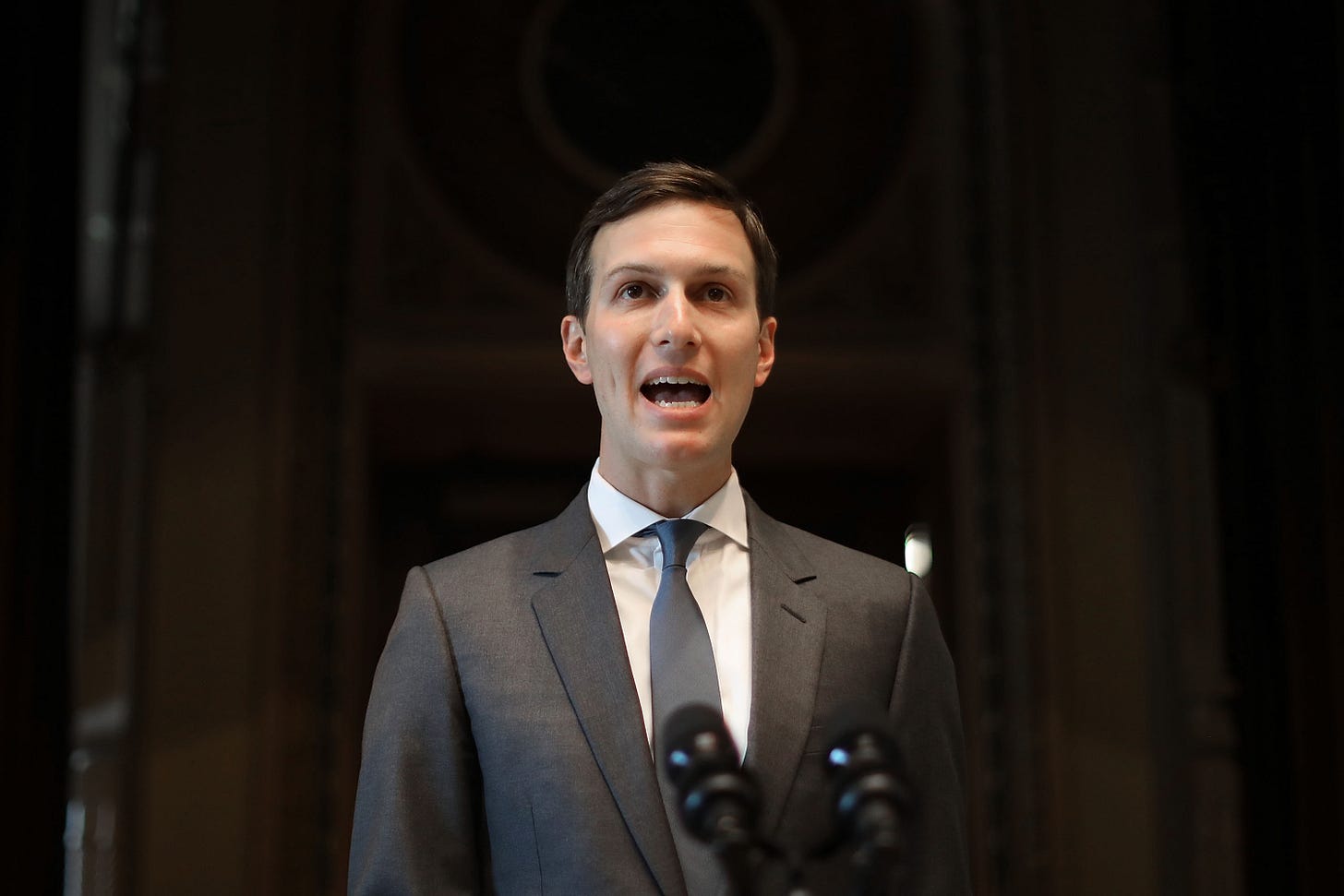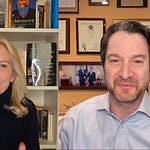[Editor’s Note: Some disclaimers to Navarro's claims in the audio are provided in the text below.]
Jared Kushner, presidential son-in-law, speaking at the Eisenhower Executive Office Building next door to the White House on June 19, 2017. (Photo by Chip Somodevilla/Getty Images)
Last week was a very busy week for former White House advisor Peter Navarro.
On Monday, Navarro published a scathing article in something called the “American Greatness” entitled “The Clown Prince of Pennsylvania Avenue.” No prizes for guessing that it was about Jared Kushner. Navarro squarely blamed Kushner (as well as former Trump campaign chief Brad Parscale) for Trump’s 2020 election loss. Navarro claimed that, in regard to Kushner’s upcoming memoir Breaking History (which I covered earlier this month and about which I’ll have my own review shortly), “the work of fiction Jared is now readying for publication is just more self-serving manure to shovel over the past and obscure our view of the damage.”
On Wednesday, Navarro filed a motion with federal court in Washington, asking that the criminal contempt of Congress charge brought against him after his failure to comply with a House January 6 Committee subpoena be dismissed.
Two former White House colleagues of both Navarro and Kushner told me they found the apparent feud between the two men “ironic” because, as one remembered it, it was Kushner who brought Navarro into the White House, having looked on Amazon for books on trade with China and “discovered” Navarro and on-boarded him—“the sloppiest vetting imaginable,” according to this person. Now, Navarro says that this is absolutely not what happened. Kushner, he says, had nothing to do with his hiring. (See the full Q&A for Navarro’s version of events.)
Meanwhile, a second source from the White House says the irony here is that Kushner didn’t fight hard enough—if at all—against Navarro’s ideas or influence over Trump. “The president didn't let us fire Navarro, but we all hated him,” says this person. “Every chief of staff tried to try to make Navarro disappear. Yet the president kept protecting him. Jared kept shrugging his shoulders. In typical Jared fashion, he didn't get involved. And in the beginning, Jared defended Navarro’s hiring.”
Peter Navarro outside the White House October 08, 2019 in Washington, DC. (Photo by Chip Somodevilla/Getty Images)
Given all this, I asked Navarro to explain his reasons for his assault on Kushner and Kushner’s upcoming book, given that he’s dealing with what is presumably a time-consuming—not to mention very high-stakes—legal battle with Congress.
Below is our Q&A.
(Note: Navarro insisted upon a written exchange as a condition for the interview. That’s not unheard of, but what is more unusual is that, at his suggestion, we then later separately recorded our responses in order to offer an audio version. It’s clear he did not want to have an unscripted conversation. However, I thought some of you might want to hear his voice. The audio can be played above. The written transcript follows in full.)
WARD: Peter, what prompted you to write your article on Jared Kushner in “American Greatness”?
NAVARRO: This article is excerpted from my new book Taking Back Trump’s America, and in that book I offer a refinement of the old Reagan saying that “personnel is policy”—if you hire the wrong people and put them in the White House, you will get the wrong result.
In Taking Back Trump’s America, I explain in a more textured way how “bad personnel” is not just “bad policy” but also “bad politics” and explain how bad personnel—from Secretary of State Rex Tillerson, Secretary of Defense Jim Mattis, and National Security Advisor John Bolton to the Directors of the National Economic Council Gary Cohn and Larry Kudlow—contributed to five major strategic failures that led to the fall of the House of Trump. Of those bad personnel who contributed most to those strategic failures and that fall, Jared Kushner, along with Steve Mnuchin, sits at the top of the pyramid.
It has turned my stomach to watch Jared Kushner leak out a series of articles based on his new book which is nothing more than a work of self-aggrandizing fiction. My article which you reference is a response to Jared attempting to revise history for his benefit. If just Jared Kushner had never darkened the door of the White House, Donald Trump would still be sitting behind the Resolute Desk in the Oval Office.
WARD: You’ve also said in other articles you think that Kushner didn’t have cancer—that it could be a stunt to sell books. Can you elaborate on why you think that?
NAVARRO: I never said he did not have cancer. What I will say here is that Kushner’s revelation of that is nothing more than a soap operatic stunt designed to evoke sympathy for a calculating Cassius while he pimps his new book.
WARD: So what do you think Kushner’s motive is in writing this book?
NAVARRO: I do not think it is to make money. He has shamefully cashed in on his White House connections in a way that will dwarf any book royalties—while his rug merchant behavior reflects poorly on the Trump administration.
As I note in Taking Back Trump’s America, Jared’s modus operandi has always been to take credit for whatever worked, blame others for what did not, and run to his daddy-in-law whenever the big bad Chief of Staff or anybody else got in his way in the West Wing. The first two elements of this troika—take credit and shift blame—seem to be the foundation of his new book. If you are going to waste your money on that book, at least buy Taking Back Trump’s America so you can get the real picture.
WARD: Is it coincidence that it comes at the time of the raid on Mar-a-Lago and the Jan. 6 hearings?
NAVARRO: As I face a possible two-year prison term simply for standing up for the Constitution and the institution of executive privilege while doing my duty to my commander-in-chief and my country, Jared’s testimony has been prominently used by the Jan. 6 partisans to build the criminal case against Donald Trump. It is what it is.
WARD: There were reports that Kushner hired you after googling your book on trade with China on Amazon. Was that true? If it’s spin, whose spin and why? What’s the real story?
NAVARRO: I set the record straight about this malicious spin in Chapter 4 of Taking Back Trump’s America. It was a false factoid that was repeatedly used to denigrate my skill set on China in international trade policy by the corporate media, and Kushner never bothered to set the record straight. Here is the relevant excerpt from Taking Back Trump’s America:
The Coming China Wars would be my first bestseller, and it would lay bare both China’s economic aggression as well as its tendency to sell to the American consumer literally millions of products that could harm or kill you or your pets. More importantly in terms of this opus, it would be The Coming China Wars that would be responsible for me winding up in the Trump White House.
In 2011, Citizen Trump would place The Coming China Wars in his top ten favorite books about China. That kindness would, in turn, catalyze a correspondence between me and the president through his executive assistant, Rhona Graff. And when the Boss announced his candidacy for president in 2016, in part on a Tough on China platform, I was all in.
And so it was that I now found myself sitting in the warm sand on Victoria Beach [in California] helping Candidate Trump’s one and only speechwriter with what would become arguably the best speech—at least on economics and trade—of the president’s career.
WARD: You’ve read bits of Kushner’s book. Your views?
NAVARRO: Asked and answered. He is taking undue credit for things he had little to do with or almost screwed up and shifting blame for his monumental failures. Here’s a quote from an email from someone on my own team I got just today. This White House insider had direct knowledge of the border wall fight, for which Kushner wrongly takes credit for helping to win:
Kushner is so full of himself as you rightly describe [in your Kushner article]. It was the [Stephen] Miller team that identified the various asset seizure funds and developed the DOD re-appropriation Emergency Declaration in the 3rd quarter of 2018. Miller’s [team] ran the PCC [Policy Coordinating Committee] process in spite of the opposition from [Andrew] Olmem at NEC and [John] Kelly's team. We also included remittance taxes and greatly raising the Fed US-to-Central America wire fee that Obama had reduced from $9.00 to $0.90 in his "Expedito to Mexico" program. Kushner and team were not in the discussions. Revisionist history for him to take credit. He may have later had some inconsequential talks with [House Speaker Paul] Ryan yet months prior we knew the Congress would not entertain wall funding.
WARD: You call him the “Clown Prince” and say he only got the White House job because of nepotism. Can you explain?
NAVARRO: The “Clown Prince” is an obvious takeoff on Kushner’s well-publicized relationship with the Crown Prince of Saudi Arabia, Mohammad bin Salman, who not only had Jamal Khashoggi killed in the most brutal of ways but consistently played Kushner like a drum and a puppet. No one in the National Security Council or State Department was ever comfortable with the diplomacy duets of the Clown and Crown Princes, and this bromance was yet another public stain on the Trump administration caused by Kushner.
As for the nepotism remark, there is no other scenario in the world where Jared Kushner, at his young age and with his empty resume, would ever command one of the highest-ranking posts in a White House. He was constantly learning on the job; the learning curve in the White House is extremely steep, and his screw-ups were legion.
WARD: So what did his father-in-law really think of him? You say that Trump didn’t see the harm that Kushner caused. Can you explain why?
NAVARRO: Jared had constant and preferential access to both the East and West Wings and thereby daily opportunities to take credit or shift blame as the situation might warrant. Nobody in the administration could—or had the cojones—to compete with that, and, even though all four Chiefs of Staff in the Trump White House were mediocre or worse (this, too, is documented in Taking Back Trump’s America), all of these Chiefs had a lot of help in their failures from Jared and his backstabbing and back-channeling. At times, I almost felt bad, particularly for John Kelly. (Almost.)
WARD: Did you or anybody else try to tell Trump what you really thought of Kushner?
NAVARRO: I can’t speak for anyone else. As for me, the Boss knew how I felt, particularly at the end, and he knew particularly how Kushner was mismanaging the campaign. In fact, there is a great chapter in Taking Back Trump’s America about how Steve Bannon almost took over that campaign, but Jared killed that initiative with more of his daddy-in-law maneuvering.
WARD: What are some of the issues that caused friction between you and Kushner?
In the beginning of the administration, Jared’s constant interference and back-channeling in our negotiations with Communist China would bedevil both me and United States Trade Representative Bob Lighthizer. Together with Larry Kudlow and Steve Mnuchin, Kushner would constantly signal weakness and compromise to the Chinese on behalf of his Wall Street handlers like Steve Schwarzman and Larry Fink and make it very difficult for the Chinese to take us seriously. Particularly at the beginning of the negotiations, the Communist Chinese side had no idea who was really calling the shots—the China Hawks (Lighthizer, Bannon, and Navarro) or the Wall Street rug merchants (Kushner, Mnuchin, and first Gary Cohn and then Larry Kudlow). So they were always playing up to the rug merchants at the expense of progress.
Fast forward to 2020. As the pandemic hit, I would clash repeatedly with Kushner over how to manage our response. In my 2006 [book] The Coming China Wars, I had predicted Communist China would likely cause a global pandemic that would kill millions, so I was on high alert as early as January and February of 2020, working very hard to get Personal Protective Equipment and therapeutics like monoclonal antibodies and hydroxychloroquine to the American people. Yet in those early months, I got constant push back from virus deniers like Kushner and Kudlow in the White House. [Editor's note: This assessment is Navarro's opinion of Kushner and Kudlow's understanding of the significance of COVID-19; I have no reason to believe that either Kushner or Kudlow ever denied the existence of the virus.]
Once Kushner figured out the virus was a real problem, he decided to Bigfoot it and brought in a whole team of young wunderkinds from Silicon Valley to screw things up. It was, as they say, a cluster f**k; but no matter what Kushner did wrong, he would never take the blame, and whatever went right, he would jump to the head of the line to get a pat on the head from the Boss. In fact, Kushner would not ever let anybody into the Oval Office to brief the president who might take away credit from him. And, yes, there is a whole lot more about Kushner’s foibles in Taking Back Trump’s America.
WARD: How clear were you in telling Kushner what you thought of him at the time? Examples? What was the biggest gripe?
NAVARRO: I told him he was wrong all the time and fought him tooth and nail. Here, the worst thing he did for our future besides screw up the negotiations with China and muddy up the NAFTA deal was to cut a secret deal with the Communist Chinese over a fiasco called Operation Skybridge, which effectively took all the money Congress had appropriated to manufacture PPE here in America and hand those funds over to the Chinese so they could make inferior products that could kill Americans and [they could] laugh all the way to the bank. Just so damn foolish.
WARD: You mention his business dealings and his coziness with MBS and his apparent cashing in on his White House connections after leaving office. Was it clear to you that he seemed to be considering self-dealing all along? If so, what exactly did you see?
NAVARRO: Do not just follow the money here. Look at who is working for Kushner now [who] worked in the White House. Of course, both Kushner and Mnuchin were building their networks in the Middle East and in China so they could raise money once they got out of the White House, and the way they did it, which was scurrilous and treasonous, was to grant favors and preferential access that weakened our policies. Mnuchin, in particular, is nothing more than a money-grubbing rug merchant clueless to the broader global and national security environment. Mnuchin was the Neville Chamberlain of our time. [Editor’s Note: Despite the appearance of impropriety in Kushner and Mnuchin's recent business dealings, I cannot confirm—and Navarro has not substantiated—the allegations that either individual in fact granted "favors and preferential access" while in public office in exchange for business advantage.]
WARD: Which of your colleagues did Kushner sabotage and how?
NAVARRO: This is all in Taking Back Trump’s America. Kushner’s worst victims were Reince Priebus and John Kelly, the first two Chiefs of Staff. It was impossible for either one of them to maintain any kind of coherence in managing the West Wing; Kushner would constantly go behind their backs to countermand their orders. Neither Reince [n]or Kelly ever had a chance.
Lighthizer had to constantly suffer from Kushner’s meddling in both the China and NAFTA negotiations, although Bob was always too kind to publicly acknowledge any of that. As I noted earlier, Stephen Miller often had to fend off Kushner. And so it went.
WARD: Were there any positives you can think of?
NAVARRO: You might think the Abraham Accords, but when the real story gets out about that—if it ever does—you will see that National Security Advisor Robert O’Brien [and] his NSC staff had a whole lot more to do with success in those negotiations while Kushner’s meddling at times simply got in the way.
WARD: What’s the worst allegation Kushner makes in his book—the one you think is most false?
NAVARRO: Here, the Kushner sum is together far bigger than any single part. The worst victim is history itself. He is simply trying to revise it in a way where people will believe he was the real president when things worked and the rest of us were just pawns on his chessboard. God help this Republic if Kushner ever darkens the door of the White House again.
WARD: Why do you think that Kushner has distanced himself from Trump since leaving the White House?
NAVARRO: Look, Jared has had his fun, and he is moving on to feather his own nest at the expense of this country. It is an open question as to whether Jared is distancing himself from President Trump or vice versa—and that’s not for me to answer.
WARD: Anything else you’d care to say?
NAVARRO: Despite the Kushners and Mnuchins of the West Wing, Donald Trump put up statistics that qualify him as the best president in modern history on the economy. We also had four years of peace and stability while Communist China, Russia, Iran, and North Korea behaved themselves, at least on national security matters. Just imagine how much better it would have been if Kushner (along with others like Mnuchin, Mattis, Tillerson, Cohn, Kudlow, Kelly, and Mulvaney) had never been in the Trump administration, and you quickly get a much better understanding of why I wrote Taking Back Trump’s America. I hope your readers will give it a look in the print edition or listen in the audio addition if for no other reason than as an antidote to Kushner’s fiction.
So that’s it from Navarro. I’ll have my own review of Kushner’s memoir coming shortly, so stay tuned for that—and be sure to subscribe if you want it in your inbox as soon as it comes out.















